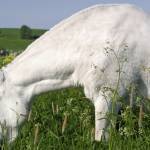Old Horses and Gastrointestinal Disease

Horses in their mid-teens and older are more likely to die of gastrointestinal disease than any other cause, according to a report from researchers at the University of Kentucky, Department of Veterinary Sciences.
In a retrospective study spanning two years, 113 necropsies were performed on horses over the age of 15. Results of the study indicated that the primary organ system contributing to death was the gastrointestinal system, with specific diagnoses in this group of “strangulating lipoma; small intestinal entrapment, devitalization or rupture; large colon displacement, torsion, impaction, or rupture; and necrotizing colitis of bacterial or unknown etiology.”
While equine nutrition experts cannot guarantee a way to keep aged horses from developing these problems, certain feeding strategies provide a logical leaping-off point. Catherine Whitehouse, M.S., a nutrition advisor for Kentucky Equine Research (KER), offers these tips.
- Forage should be the cornerstone of any horse’s diet. Good-quality forage that is fed in line with a horse’s energy needs is vital. “In addition to caloric sufficiency, horses should be offered forage compatible with their dental health. Those that wad up grass or hay and then spit it out, a behavior known as “quidding,” should be offered alternative forage sources such as dampened hay cubes or pellets,” suggested Whitehouse.
- Aged horses with weight issues often benefit from a concentrate feed that contains varied energy sources, which means calories are conferred through starch (cereal grains such as oats, corn, and barley), fat (stabilized rice bran and vegetable oils), and fermentable fiber (soybean hulls and beet pulp). Many of these feeds are pelleted, which can also help horses with impaired dental function, as they are easier to chew. “All concentrates should be doled out according to the manufacturer’s recommendations,” advised Whitehouse. “Some feeds formulated specifically for aged horses have a much higher feeding rate than typical feeds, so these must be fed to specs or vitamin and mineral fortification will not be adequate.”
- As horses age, herd dynamics could impact feed intake. Older horses might take longer to eat than younger ones, so when grouped with more youthful, dominant horses, aged horses might not get their fair share of forage or feed. To avoid problems, separate older horses from the herd so they can safely and comfortably consume their rations.
- Inadequate water consumption is thought to contribute to cases of impaction. How much water a horse drinks depends on a variety of factors, which include type of forage, weather, and workload, among others. Provide fresh, clean water at all times.
- Parasites can keep a horse from looking and feeling its best. “More and more horse owners rely on fecal eggs counts to determine deworming requirements. Once eggs are counted and categorized, veterinarians can offer deworming recommendations that best suit the older horse,” said Whitehouse.
KER sells a complete line of nutritional supplements designed to target specific problems. Australian horse owners can see the entire product range here.
Miller, A., A. Loynachan, and A. Adams. 2017. Causes of mortality in aged horses in Kentucky. Equine Disease Quarterly 26:2.








